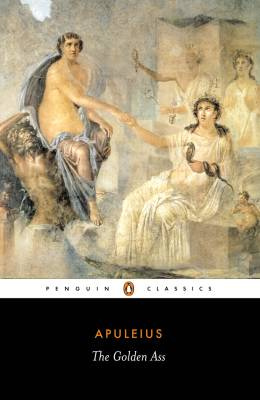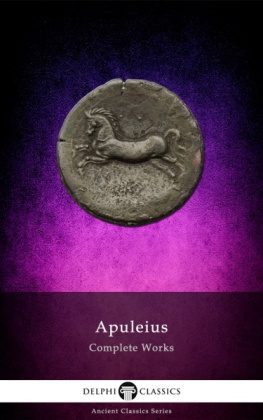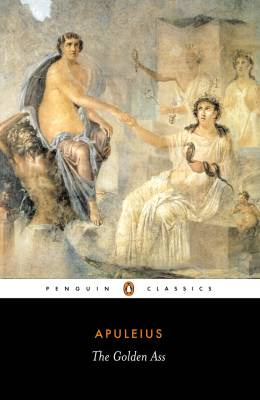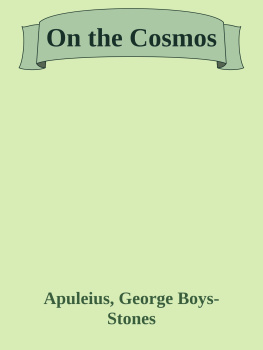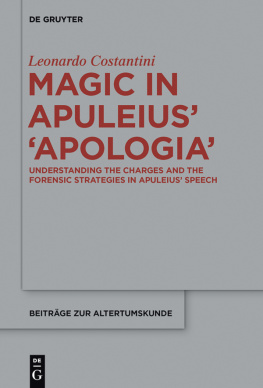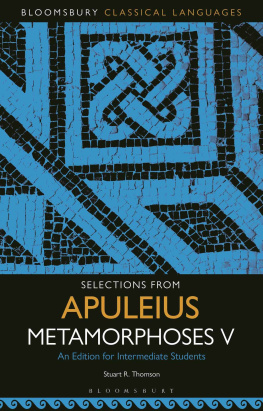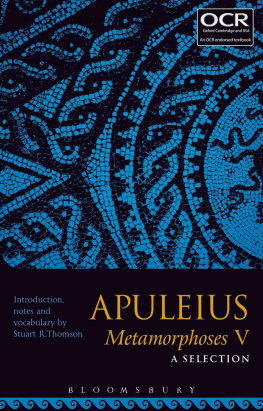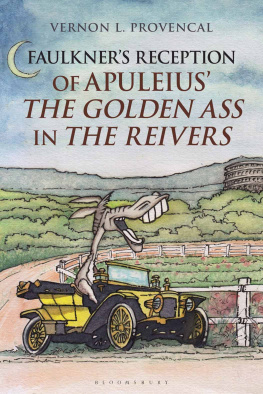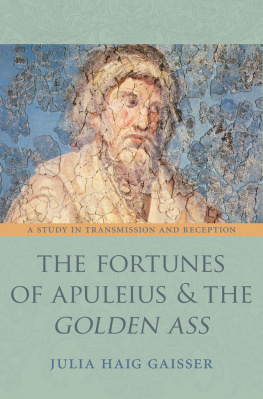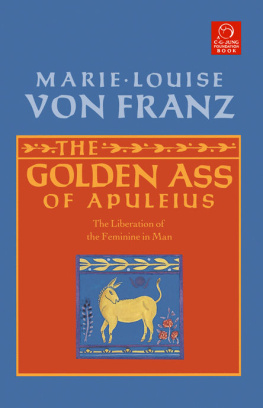APULEIUS (we do not know his other names) was born about AD 125 in Madaura or Madauros, a Roman colony in North Africa, now Mdaourouch in Algeria. His father, from whom he inherited a substantial fortune, was one of the two chief magistrates (duouiri) of the city. For his education Apuleius was sent first to Carthage, the capital of Roman North Africa, and then to Athens. During his time abroad he travelled widely, spending some time in Rome, where he practised as a pleader in the courts. While detained by illness on his way home at Oea in Tripoli, he met and married the wealthy widow Pudentilla. This was at the instance of one of her sons, whom he had known at Rome; but other members of her family objected to the marriage and prosecuted Apuleius on various charges, principally that of winning Pudentillas affections by magic. Their accusations were brilliantly, and it would seem successfully, rebutted in his speech De Magia or Apology, delivered in or shortly before AD 160. He appears to have spent the rest of his life in Carthage, where he became a notable public figure, holding the chief priesthood of the province and receiving other public honours.
The age in which Apuleius lived was that of the Antonine emperors Antoninus Pius and Marcus Aurelius, described by his contemporary the Greek sophist Aelius Aristides in his oration To Rome as a period of unexampled prosperity and felicity, a verdict echoed by Gibbon in the opening chapters of The History of the Decline and Fall of the Roman Empire. It was an age in which success in public speaking offered a passport to fame, and Apuleius owed his contemporary reputation to the mastery of language deployed both in his many display speeches, of which we have excerpted specimens in his Florida, and in the Neoplatonic philosophical writings which earned him a statue in his native city. Of these the most important which survive are On the God of Socrates (De Deo Socratis) and On Plato and his Doctrine (De Platone et eius Dogmate). An imposing range of other writings in both prose and verse we know of only from fragments and references in other authors. The modern world knows him best as the author of the great serio-comic novel The Golden Ass or Transformations (Metamorphoses), which he is generally thought to have written after his return to Carthage. He probably died about AD 180.
E. J. KENNEY is Emeritus Kennedy Professor of Latin in the University of Cambridge. He was born in 1924 and was educated at Christs Hospital and Trinity College, Cambridge, of which he was Scholar and Fellow. In the Second World War he served in the Royal Signals in the United Kingdom and India, being commissioned in 1944. From 1953 to 1991 he was a Fellow of Peterhouse, Cambridge, where at various times he held the offices of Director of Studies in Classics, Senior Tutor, Librarian and Domestic Bursar. His publications include a critical edition of Ovids amatory works (1961; second edition, 1995) and editions with commentary of Lucretius De rerum natura III (1971), Apuleius Cupid and Psyche (1990) and Ovids Heroides XVIXXI (1996); and he is currently preparing a commentary on Books VIIIX of Ovids Metamorphoses, to appear in a five-volume edition of the entire poem. In 1968 he was Sather Professor of Classical Literature at the University of California at Berkeley; his lectures were published in 1974 as The Classical Text (Italian translation, 1995). He is a Fellow of the British Academy and a Foreign Member of the Royal Netherlands Academy of Arts and Sciences. He is a past President of the Joint Association of Classical Teachers and of the Classical Association, and is currently President of The Horatian Society.
APULEIUS
The Golden Ass
or Metamorphoses
Translated with an Introduction and Notes by
E. J. KENNEY
PENGUIN BOOKS
PENGUIN BOOKS
Published by the Penguin Group
Penguin Books Ltd, 80 Strand, London WC2R 0RL, England
Penguin Putnam Inc., 375 Hudson Street, New York, New York 10014, USA
Penguin Books Australia Ltd, 250 Camberwell Road, Camberwell, Victoria 3124, Australia
Penguin Books Canada Ltd, 10 Alcorn Avenue, Toronto, Ontario, Canada M4V 3B2
Penguin Books India (P) Ltd, 11 Community Centre, Panchsheel Park, New Delhi 110017, India
Penguin Books (NZ) Ltd, Cnr Rosedale and Airborne Roads, Albany, Auckland, New Zealand
Penguin Books (South Africa) (Pty) Ltd, 24 Sturdee Avenue, Rosebank 2196, South Africa
Penguin Books Ltd, Registered Offices: 80 Strand, London WC2R 0RL, England
www.penguin.com
First published 1998
Reprinted with revisions 2004
17
Copyright E. J. Kenney, 1998, 2004
All rights reserved
The moral right of the translator has been asserted
Except in the United States of America, this book is sold subject
to the condition that it shall not, by way of trade or otherwise, be lent,
re-sold, hired out, or otherwise circulated without the publishers
prior consent in any form of binding or cover other than that in
which it is published and without a similar condition including this
condition being imposed on the subsequent purchaser
EISBN: 9780141904504
Contents
Acknowledgements
For various advice and information generously given I am indebted to Dr James Carleton Paget, Dr Gillian Clark, Professor John Crook and Dr Emily Gowers.
My most fundamental debt, however, is a very old one, to the framers of the Cambridge Classical Tripos as it was in 19468. In those days had no syllabus of prescribed texts, and its unstructured character encouraged the discursive exploration of Greek and Latin literature. Unprompted, I then first read The Golden Ass, as its author intended, for pleasure; a pleasure which, half a century later, it has been a delight to renew, and which I hope this translation may help a new generation of readers to share.
Abbreviations
OCD | S. Hornblower and A. Spawforth (eds.), The Oxford Classical Dictionary, 3rd edn. (Oxford, 1996). |
OLD | P. G. W. Glare (ed.), Oxford Latin Dictionary (Oxford, 1982). |
Introduction
Apuleius is the most whimsical of authors and is a law to himself. H. E. BUTLER
the [Golden Ass] is a puzzle, J. J. WINKLER
Apuleius is determined to confuse us. M. GRANT
What is conventionally termed the Prologue to The Golden Ass ends with an apparently straightforward promise of entertainment in store. Lector, intende: laetaberis Give me your ear, reader: you will enjoy yourself. That promise is amply fulfilled. This is the most continuously and accessibly amusing book that has come down to us from classical antiquity. But in The Golden Ass appearances more often than not turn out to be deceptive, and there is a good deal more in this short Prologue than immediately meets the eye.

